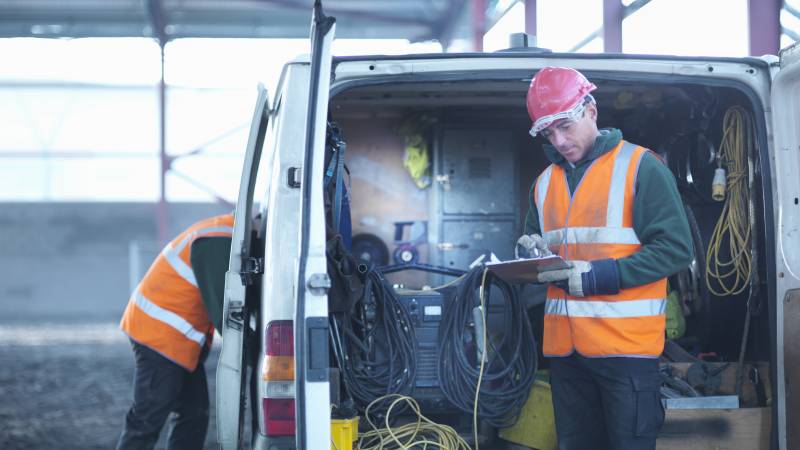It’s often assumed a college degree is an absolute must for anyone who wants a lucrative career. However, when it comes to earning a lot of money, a degree isn’t the only option.
If you enjoy working with your hands, jobs in the skilled trades can be every bit as lucrative as white-collar jobs requiring college degrees. Today’s most in-demand trade professionals earn upwards of six figures per year – here’s what you need to know.
What Are Trade Jobs?
Wondering what exactly a trade job is? As career resource Monster.com writes, trade jobs are are labor positions that require special training or specialized skills. Trade jobs often involve labor and a true hard day’s work – many trade job positions are physical rather than performed behind a desk.
The biggest benefit of choosing a skilled trade career is the specialized training you receive. You learn exactly what you need for a certain career or industry, and as you grow your skills and experience on the job, you’ll be able to grow your career too.
How to Find Trade Jobs
The steps that are involved in pursuing a career in the skilled trades vary by profession. However, you can expect the journey to look something like this:
Learn the Basics as a Hobbyist. Before pursuing any formal training, get some practice on an informal basis. Learn how to use the power tools of your desired trade and go online for tutorials. Even a small amount of familiarity with the trade will come in handy.
Complete Formal Training. Although it’s not required to apply for an apprenticeship, you’ll enjoy a leg up on the competition by obtaining formal skilled trade training through a technical school or a community college. Vocational, trade, and technical school programs tend to be quick, and you’ll earn a certificate.
Complete an Apprenticeship. The traditional way to find an apprenticeship program in your desired skilled trade is by checking with local chapters that represent your chosen trade. Skilled trade apprenticeships typically last up to five years. During that time, you’ll work under a master tradesman while earning money.
The Best Trade Jobs Right Now
If you want to pursue a career in the skilled trades, which professions should you consider for the best job security and compensation? Here’s the scoop on four of today’s best jobs in the skilled trades:
Longshoreman
If you want an active, hands on job, there’s no better way to cash in on both your skills and your worth than by becoming a longshoreman. A centerpiece of international ports and crucial players in transporting goods worldwide, longshoremen transport containers from ships to their next destination, ensuring the right goods get to the right destinations. You’ll find yourself loading and unload freight, as well as working with international imports and exports.
To become a longshoreman, you’ll need to:
- Apply for and obtain a TWIC (Transportation Worker Identification Credential) card
- Visit your local port union that employs longshoremen and begin building work experience as a casual worker who picks up available hours
- Gain enough experience to become recognized by the union and eligible for union membership
Electrician
Electricians install, maintain and perform repairs on electric power. Because they work closely with electricity, their work can be very hazardous. To work effectively as an electrician, you must be able to read and understand technical diagrams and blueprints; follow state and local building and safety codes; install new wiring; diagnose problems with the appropriate devices; replace old systems and much more.
Basic steps for becoming an electrician include:
- Complete a certificate program or associate’s degree program
- Complete an electrician apprenticeship
- If required in your state, take the licensing exam and obtain your license
Plumber
Plumbers repair and install water and gas pipes as well as fixtures like sinks, toilets, water heaters and sinks. They often work in cramped, dirty environments, and they rely on tools like welding torches to get the job done.
Here’s how to become a plumber:
- Complete an apprenticeship
- In most states, you have to sit for and pass a certification exam to obtain your license
- Gain additional experience and training to become a licensed master plumber or specialty plumber
Welder
Welders use an array of specialized equipment, including torches and clamps, to heat and bond metals together. To complete a job, a welder must be able to read blueprints, calculate dimensions, examine their work for defects and develop a variety of related skills.
The basic steps for becoming a welder include:
- Complete training at a community college or trade school to obtain a degree or certificate in welding
- Find and apply for a job and obtain an employment certification – these certifications are specific to the job, so a blanket certification is not available
- Obtain your AWS certification by passing the certification test
HVAC Technician
Heating, ventilation and air conditioning technicians, or HVAC technicians, work on components and systems that ventilate, cool and heat indoor areas. These systems affect indoor temperatures, air quality and humidity. HVAC techs install, repair and maintain entire systems along with the parts, supply lines and wiring.
Here’s how to become an HVAC technician:
- Complete training at a technical or trade school
- Complete a formal HVAC apprenticeship program, which usually takes three to five years
- If required in your state, obtain your HVAC license by sitting for and passing the licensing exam
Start Your Own Trade Career
This is only a taste of the skilled trades available. If you’re interested in these trades highlighted and those not mentioned, it’s best to do your own research to find a trade profession that suits what you enjoy and what you’re looking for in a career.
Like anything, it’s always a good idea to be aware of the latest research. We recommend comparing at least 3 or 4 options before making a final decision. Doing a search online is typically the quickest, most thorough way to discover all the pros and cons you need to keep in mind.



